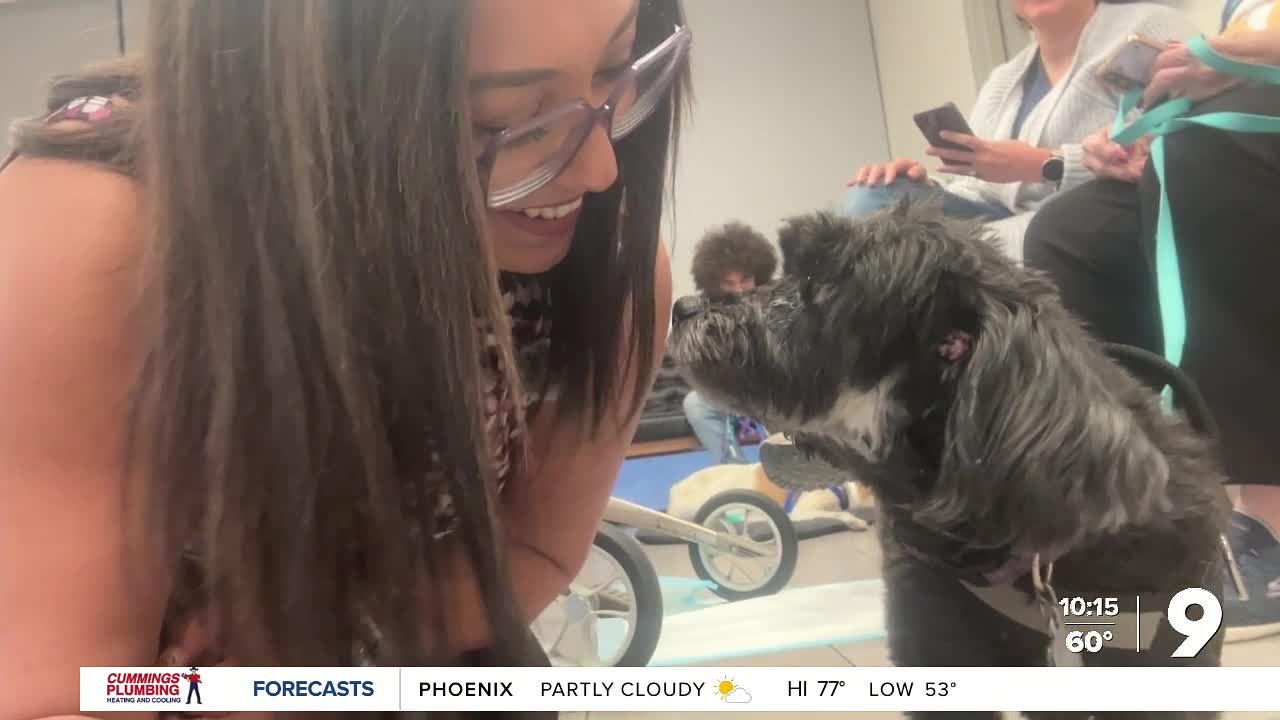ORO VALLEY, Ariz. (KGUN) — The holidays are here, and while you're enjoying Thanksgiving dinner, those puppy dog eyes might be begging for a taste. But before you share your feast, veterinarians warn that certain foods could send your furry friend to the emergency room.
Brooke Croel, emergency veterinarian at Veterinary Emergency Group (VEG) hospital in Oro Valley, sees the consequences every year when pet owners give in to temptation.
"Every year we see an uptick in cases of bone ingestion, vomiting, diarrhea, pancreatitis, consistently every year after Thanksgiving and Christmas from people wanting to include their pets," Croel said.
If you absolutely must share, there are strict guidelines to follow. Avoid anything with garlic or onion, which Croel says can be particularly dangerous.
"Those can cause life-threatening anemia when consumed in large enough quantities," Croel said.
Stay away from grapes and raisins because they can cause kidney failure. Fatty foods are also harmful to pets.
"So anything buttered, any desserts, ham, especially is a really big offender cause those are gonna lead to things like pancreatitis," Croel said. "Which is inflammation of a little finicky organ that lives alongside our intestine that can cause really bad vomiting, diarrhea."
Pet owners are taking these warnings seriously.
Rosemary Lane, whose 14-year-old dog Maggie is on a special low-fat diet, usually doesn't give her any leftovers.
"Especially with older dogs. I think the fatty foods are very, very hard for them to digest," Lane said.
Meg Robertson, owner of dog Mia, is also making sure her dog stays healthy.
"This sounds terrible, but I'm not gonna give her anything because she has a really sensitive stomach," Robertson said. "I do have Hills Science Diet turkey and rice for sensitive stomach and skin and she loves that."
So what can you safely give your dog or cat? They can enjoy unseasoned white meat turkey, green beans, carrots, plain rolls, plain mashed potatoes and pumpkin puree – but only in small amounts. It's crucial to make sure all foods have no seasoning.
Danny Esquivel gives his dog Buddy just a few careful bites.
"He gets breasts but just a little bit. I don't do anything that's going to affect him. Anything I eat I make sure that it doesn't have any seasoning salts or anything like that. I cut it up into tiny pieces," Esquivel said.
Croel says if something is wrong, some of the symptoms to be aware of are vomiting, diarrhea, pale gums, and mood changes.
"So all in all, if you're worried, we're here 24/7. You can always call and speak to a doctor. So I'm always just gonna encourage people to call and just, you know, either get that peace of mind or make that plan to come in if we are worried to look at your kiddo in person and make sure they're OK to stay home," Croel said.
To avoid the emergency exam fee of $185, plus the diagnostic testing and treatment prices, play it safe and watch what your pet's eating.
"While we do have different financing options to work with people, if for nothing else, the money you could save — I definitely encourage people to be more restrained and try to not give their pets any treats," Croel said.
"I would love to keep your pets home with you for the holidays."
This story was reported on-air by a journalist and has been converted to this platform with the assistance of AI. Our editorial team verifies all reporting on all platforms for fairness and accuracy.
——
Vanessa Gongora is KGUN 9's Westside reporter.. Vanessa fell in love with storytelling by growing up in sports. She was fascinated by how sports reporters go beyond the x's & o's to tell players' stories, and how sports bring people together, inspiring Vanessa to provide the same impact as a journalist. Share your story ideas and important issues with Vanessa by emailing vanessa.gongora@kgun9.com or by connecting on Facebook, Instagram, and X.







